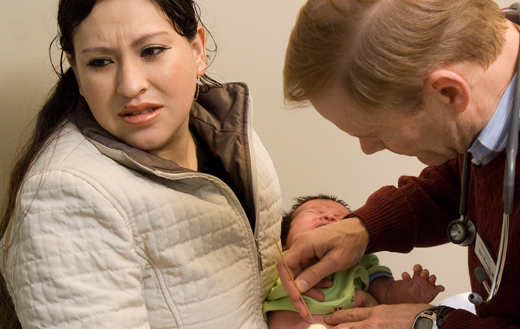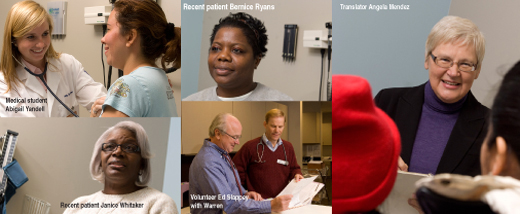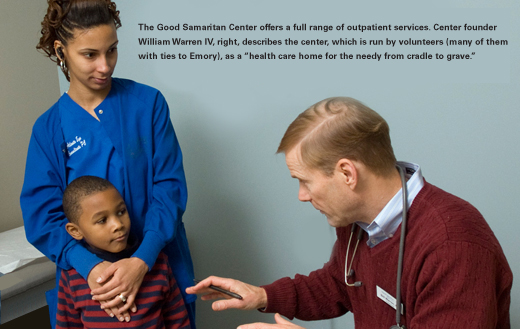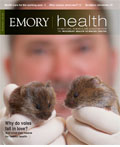Bargain health care

The great-grandson of Coca-Cola founder Asa Candler, William Warren puts the Good Samaritan story into daily practice at his nonprofit health clinic.
In a downtown Atlanta clinic, Emory alums, volunteers, and students offer the indigent and working poor something they can’t find elsewhere.
By Mary Loftus
The waiting room of Good Samaritan Health Center in Atlanta is nearly full at 10:30 this Tuesday morning: A young couple holds a baby with a cough, passing her back and forth. A woman sits wrapped in a plaid blanket. Two elderly patients discuss their medications. A toddler with a Spiderman backpack hangs upside down while his dad ties his sneakers.
A donation basket in the corner holds travel-size soaps and shampoos. A sign for the dental clinic reads: “$50 flat fee unless destitute—must bring current letter from shelter.” On the wall is a plaque of donor names, and beside them, a quote from Matthew 25:40: “I tell you the truth, whatever you did for one of the least of these brothers of mine, you did for me.”
Fifteen years ago, Good Samaritan’s founder and president, William Warren IV, decided to leave a successful pediatrics practice to provide primary care to people who were unable to afford it otherwise. A fifth-generation Atlantan and a 1979 graduate of Emory’s medical school, Warren is the son of William C. Warren III (an Emory business school graduate), grandson of William C. Warren Jr. (a 1922 Emory medical school graduate), and great-grandson of Coca-Cola founder Asa Candler.
“The idea of philanthropy was ingrained in me,” he says. “I sensed in my heart the need to do this, as a Christian and as a human being.”
In 1998, after volunteering at several free clinics and churches, Warren felt called to open his own private, nonprofit health care clinic in a renovated warehouse near Centennial Olympic Park to serve the indigent and working poor.
This spring, just 12 years later, Good Samaritan moved into a new building that has allowed it to triple its space. With 18 treatment rooms, 15 dental chairs, and a mental health suite, the clinic is staffed by 30 paid employees and several hundred volunteers, including Emory medical students and physician assistants in training.
“A lot of hard-working people come to see us here. These are people who change sheets, flip burgers, take care of us. But no one is taking care of them,” Warren says, while working his way through a stack of paperwork on his desk. The center is a nonprofit that takes no government funding, operating solely on private donations. “As individuals, we have an obligation to help that sick 2-year-old with no health insurance and a 104-degree fever. We do, not the government.”

“You want to come back again”
Today, as most days, medical staff and volunteers bustle about, reading charts, talking with patients, discussing cases, writing prescriptions. Snippets of conversation in several languages drift through the hallways.
“Many of the patients speak Spanish or Portuguese, so there is often the need for interpreters as well as medical volunteers,” says Abigail Yandell, a second-year Emory medical student and Good Samaritan volunteer. “I’d say about half of our class volunteer their time here or at another clinic.”
Last April, Yandell helped start a Monday night clinic at “Good Sam,” as the students call it, which allowed the near-capacity center to take on new patients and provided more convenient hours for those who work.
“There’s a steep learning curve here for student volunteers, but it’s the type of experience that if you do it once, you want to come back again,” says Yandell, a Memphis native who knew from second grade on that she wanted to be a doctor. “You leave feeling happy and encouraged by the patients, who are so appreciative of the care.”
Yandell remembers in particular one patient with type 1 diabetes whose disease had landed her in the emergency room. The hospital released her with just one of several medicines she needed to maintain her health. “She wasn’t given the care she deserved,” Yandell says. “The ER is not the right place for people with chronic diseases. They need primary care and follow-ups to learn how to properly manage their illnesses.”
Clinic coordinator Jonathan Beus began volunteering at Good Sam in 2007 during his first year of medical school. He believes student-run clinics provide a win-win situation for students and patients, with the quality of patient care protected by preceptors (usually from the Emory faculty) that students recruit. “Students who volunteer at the clinic learn about the lives of and challenges in caring for the working poor,” Beus says, “and patients receive care they may not be able to access otherwise.”
Volunteer Marisa Rea, who will receive her master’s of medical science in Emory’s physician assistant program in December, selected the program for a similar reason: its focus on providing primary care to underserved populations.
“Like most people who go into a health care profession, I want to help people in need,” she says. “Because Good Samaritan is a learning environment, we are encouraged to take our time and form a relationship with patients. Many of the patients come to the clinic on a regular basis, and I find myself looking forward to seeing them.”
And when those patients leave the clinic with medicine in hand and a greater knowledge of how to care for themselves, Rea feels the clinic is performing “a tremendous service to the Atlanta community.”

Spreading the good news
The need for the Good Samaritan Health Center is apparent in its rapid growth. Starting with only eight staff members and a handful of volunteers, it has an annual budget today of $2.5 million and 25,000 patient visits a year. The center charges reduced fees based on a sliding scale that considers income and family size.
Because there are no geographic restrictions, patients often make a long trek. For example, Bernice Ryans, 42, has been coming to Good Samaritan for her health and dental care for nearly five years, even though the facility is an hour’s drive from her house. “When I lived in Alabama for a few years, I had no dentist, so when I got back here I had 11 cavities,” says the single mother. Her oldest son, who has asthma, comes to Good Samaritan for his health care too.
Good Samaritan has two affiliates, in Gwinnett and Cobb counties. Although those centers have separate boards, they “cross-pollinate” with the original clinic, Warren says. “We helped birth them.”
Low-cost clinics have been hard hit by the recession, both in increased need for services and decreased donations, according to Warren. “We are filling a need that is not met elsewhere. People come to us because they have nowhere else to go,” he says. The staff and volunteers see patients for everything from earaches to cancer, providing vaccinations and minor trauma care. Warren describes the center as “a health care home for the needy from cradle to grave.”
The only basic medical services the center is unable to provide are surgery and delivering babies. However, retired physician Edward Slappey—who practiced in Macon for 29 years—now volunteers a half-day each week, providing ob/gyn and prenatal care. Good Sam, says Slappey, lets him continue with his favorite part of his career: patient care.
Likewise, Angela Mendez, a certified translator and medical interpreter fluent in Spanish, German, French, and English, began volunteering 16 hours a week at the clinic in May after retiring. “I take it as seriously as a job,” she says. “I had many volunteer options, but here I can donate my skills and do what I’m trained to do.”
As director of the center, Warren enjoys seeing this productive confluence of retirees and students, staff and volunteers, patients and care providers. “We make a true difference in people’s lives,” he says.
Janice Whitaker, who was referred to Good Samaritan by a friend after she lost her job in the mortgage loan business—along with her medical insurance—can testify to that. The staff has provided both health care and neighborly support for her during troubled times.
“I’ve had some personal things that have happened—I lost my father right before Thanksgiving and everybody here knew what I was going through, and they were so very nice,” says Whitaker, who lives with her mother and helps care for her 101-year-old grandmother. “You just don’t find that much anymore.”


